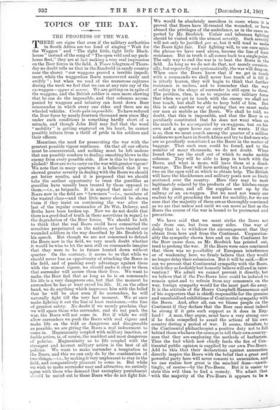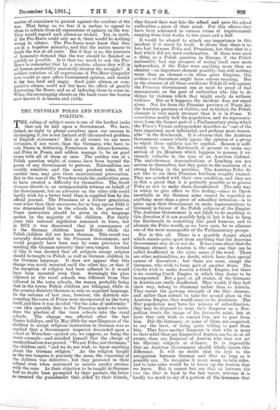TOPICS OF THE DAY.
THE PROGRESS OF THE WAR THERE are signs that even if the military authorities in South Africa are too fond of singing "Wait for the Waggon" and "The right little, tight little Block- house" instead of the song of "The open veld and my pack- horse fleet," they are at last making a very real impression on the Boer forces in the field. A Times telegram of Thurs- day.no doubt tells us that in the Zandveld (a sandy country near the shore) "our waggons proved a terrible impedi- ment, while the waggonless Boers manceuvred easily and swiftly " ; but when we read of the numerous captures during the week we feel that we can at any rate say of the ox-waggon--eppur si muove. We are getting on in spite of the waggons, and the British soldier is once more showing that he can do the impossible, and that columns accom- panied by waggons and infantry can hunt down Boer commandos in which every one rides and there are no wheeled vehicles. Credo guia impossibile. To have reduced the Boer force by nearly fourteen thousand men since May under such conditions is something hardly short of a miracle, and though John Bull may feel that the word "mobility " is getting engraved on his heart, he cannot possibly refrain from a thrill of pride in his soldiers and their officers.
Meantime, the need for prosecuting the war with the greatest possible vigour continues. On that all our efforts must be concentrated, and nothing must be left undone that can possibly conduce to dealing smashing blows to the enemy from every possible side. How is this to be accom- plished ? How are we to carry on the war withgreater vigour? We note that in many quarters it is believed that if we showed greater severity in dealing with the Boers we should get better results, and it is proposed that we should take the earliest opportunity to treat the guerillas as guerillas have usually been treated by those opposed to them,—i.e., as brigands. It is argued that most of the Boers now in the field are " bywoners "—i.e., members of the wastrel class—and that little mercy should be shown them if they, insist on continuing the war after the last of the regular commandos of De Wet, Delarey, and Botha have been broken up. Now we do not doubt that there is a good deal of truth in these assertions in regard to the denudation of the Boer forces. We should be loth to think that the real Boers could have committed the atrocities perpetrated on the natives, or have treated our wounded soldiers in the way described by Mr. Brodrick in his speech. But though we are not concerned to defend the Boers now in the field, we very much doubt whether it would be wise to let the men still on commando imagine that they were to be in future hunted down without quarter. On the contrary, it seems to us that while we should never lose an opportunity of attacking the Boers in the field, and of pushing every advantage against them with the utmost vigour, we should make it clear to them that surrender will secure them their lives. We want to niake the Boer feel that as long as he is on commando his life is a very dangerous one, but that the moment he surrenders 'he has at least saved his life. If, on the other hand, we do anything which impresses him with the belief that he will be shot even if he surrenders, he will naturally fight till the very last moment. We at once make fighting it out the line of least resistance,—the line of greatest safety. No doubt if we merely proclaim that we will spare those who surrender, and. do not push the war, the Boers will not come in. But if while we still allow surrenders we push the Boers with real vigour and make life on the veld as dangerous and disagreeable as possible, we are giving the Boers a real inducement to come in. Magnanimity coupled with military inaction, or feeble action, is, of course, the maddest and most dangerous of policies. Magnanimity as to life coupled with the strongest and keenest military action is the best of all policies. We want to make surrender a temptation to the Boers, and this we can only do by the combination of two things,--i.e., by making it very unpleasant to stay in the field, and comparatively pleasant to come in. But while we wish to make surrender easy and attractive, we entirely agree with those who demand that exemplary punishment should be meted out to those Boers who do not fight fair. We would be absolutely merciless in cases where it is proved that Boers have ill-treated the wounded, or have abused. the privileges of the ambulance, as in the cases re- ported by Mr. Brodrick. Unfair and inhuman fighting should be visited with the utmost severity. Such severity will not only be justified per se, but it will tend to make the Boers fight fair. Fair fighting will, to use once again the phrase we have used. above, become the line of least resistance. But in truth it all comes back to a single point. The only way to end the war is to beat the Boers in the field.. As long as we do not do that, not merely occasion- ally, but repeatedly and systematically, the war will drag on. When once the Boers know that if we get in touch with a commando we shall never lose touch of it till it is utterly beaten, they will begin to think that further resistance is useless, and to remember that the way of safety in the shape of surrender is still open to them. The problem, then, is so to organise our military force that when we get in touch with the enemy we shall not lose touch, but shall be able to keep hold. of him. But this is only another way of saying that we must make our men as mobile as the Boers. We shall be told, no doubt, that this is impossible, and, that the Boer is so peculiarly constituted. that he does not want when on the march to be accompanied. by ox-waggons, but on his own and a spare horse can carry all he wants. If that is so, then we must search among the quarter of a, million soldiers we now have in South Africa and try to find men who are as peculiarly constituted as the Boers in the matter of baggage. That such men could be found, and to the number of many thousands, we do not doubt. When found they are the stuff out of which to make mobile columns. They will be able to keep in touch with the Boers, and what is more, will have them at a disad- vantage. The Boer will have nothing but a farmhouse or two on the open veld at which to obtain help. The British will have the blockhouses and military posts now so freely scattered. over the country. Here they may be most legitimately solaced by the products of the kitchen-range and the piano, and all the supplies sent up by the railway or an ox-waggon. But we need not weary our readers by still preaching the need for mobility, for we are sure that the majority of them are as thoroughly convinced as we are that unless and until we can move as fast as the Boers the course of the war is bound to be protracted. and precarious.
We have said that we must strike the Boers not only from one, but from many sides. One way of doing that is to withdraw the encouragement that they obtain from here and from the Continent. Unquestion- ably the sympathy shown here and on the Continent for the Boer cause does, as Mr. Brodrick has pointed. out, tend. to prolong the war. If the Boers were once convinced that there was no possibility of European interference or of weakening here, we firmly believe that they would no longer delay their submission. But it will be said,—How can we prevent that Continental sympathy with the Boers, which they so foolishlybut honestly believe will end in inter- vention? We admit we cannot prevent it directly, but we believe that if the Pro-Boers here could. be induced to remain quiet and. to refrain from any comments on the war, foreign sympathy would for the most part die away. It is the attitude of Sir Henry Campbell-Bannerman and of his supporters that is chiefly responsible for the genuine and unsubsidised exhibitions of Continental sympathy with the Boers. And, after all, can we blame people on the Continent if they declare that the Boer case must indeed be strong if it gets such support as it does in Eng- land.? A man, they argue, must have a very strong case if he feels compelled. to assail the actions of his own country during a period of war. It seems, therefore, to the Continental philanthropist a positive duty not to fail behind. those who have the courage to tell their own country- men that they are employing the methods of barbarism. Thus the fuel which now chiefly feeds the fire of Con- tinental public opinion is supplied. by our own Pro-Boers. Add to this that their declarations against annexation directly inspire the Boers with the belief that a great and powerful party here will never consent to annexation, and. we can realise how great is the mischief done—unwit- tingly, of course—by the Pro-Boers. But it is easier to state this evil - than to find a remedy. We admit that with the majority of the Pro-Boers it appears to be a matter of .conscience to. protest against-the conduct of the war. That being so, we• fear it is useless to appeal to them to refrain from all expressions of opinion on the war. They would regard such silence as wicked. Yet, in truth, if the Pro-Boers could only see it, there would be nothing wrong in silence. The Pro-Boers must know that they are in a hopeless minority, and that the nation means to finish the war at all costs. But if that is so, the interests of humanity demand that the war should be finished as quickly as possible. Is it then too much to ask the Pro- Boers to remember that by a resolute silence they will in all human probability materially shorten the struggle? A sudden cessation of all expressions of Pro-Boer sympathy here would at once affect Continental opinion, and. render it far less loud and angry. Such joint silence, or com- parative silence, could not but have the effect of greatly depressing the Boers, and so of inducing them to come in. When the encouraging shouts on the bank cease the beaten crew knows it is beaten and yields.















































 Previous page
Previous page